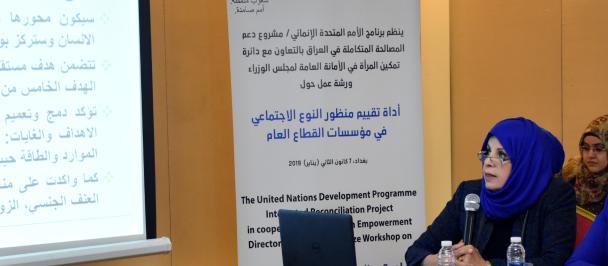Did you know, that despite decades of progress closing the gender equality gap, close to 90 percent of women and men hold some sort of bias against women?
Revealed in the recently released UNDP Gender Social Norms Index, which measures how social beliefs obstruct gender equality in areas like politics, work, and education, across 75 countries, this analysis provides new clues to the invisible barriers women face in achieving equality, and shattering the glass ceiling.
In Iraq, where the high unemployment rate (58%) and the low labour force participation (12.6%) of women is often associated with persisting social and cultural norms – whether by limiting the kind of work women are able to do safely, or through the limited economic and financial literacy of women – UNDP convened key stakeholders for a discussion in July.
In cooperation with the Women’s Empowerment Department of the General Secretariat of the Council of Ministers and the Iraqi Network for Security Council Resolution 1325, UNDP held two open discussion sessions on 8-9 July. 184 human rights defenders and gender equality advocates joined remotely, in order to discuss social norms and the increased incidence of violence against women that has been witnessed since the COVID-19 lockdown restrictions were imposed in mid-March. Discussion participants raised concerns of the greater economic and social impact of the pandemic experienced by women and girls, and its threat to un-do or weaken achievements already made in Iraq – such as the enactment of the Family Protection Act.
The crisis poses an additional threat to women's participation in the paid economy by exacerbating pre-existing and restrictive social norms that assign specific roles to women and men. It also highlighted how discriminatory legal frameworks continue to restrict women's equal access to economic opportunities.
“Many of the response procedures for dealing with crisis such as lockdown, clearly reflected the strength of social norms, which are built on male dominated systems and reduce the punishment of perpetrators due to unconscious and sometimes conscious biases. Accordingly, most cases of violence against women have been resolved tribally, despite having reached the point of murder,” stated the General Director of WED, Dr. Ibtisam Aziz. “In contrast, the quarantine measures also gave young Iraqi women an opportunity to embark on the design of many innovative solutions to stimulate their social and economic roles,” Duaa Ali, a University Law student said.
The sessions concluded with the announcement of the formation of a crisis chamber, aimed at documenting, mapping and analyzing the upward trends of violence, as well as suggesting innovative, and sustainable solutions and reviewing existing protocols and standard operating procedures to reflect the changing circumstances under COVID-19. In addition, this chamber, intends to set the stage for a new approach to the strategic engagement of partners and a new perspective to addressing the impact of social norms and gender bias in impeding gender equality during crisis. Importantly, the crisis chamber will also ensure that all COVID-19 response interventions - even if they do not explicitly address Gender Based Violence (GBV) – should help to prevent GBV and protect survivors.
At a critical moment for gender equality – the world celebrating the 64th Commission on the Status of Women (Beijing +25), the 20th anniversary of the adoption of UN Security Council Resolution 1325 and the fifth anniversary of the Declaration of the 2030 Agenda for Sustainable Development – the sharp increase in the rate of violence against women and girls in Iraq, is being brought to the forefront of the COVID-19 response. The
UNDP is supporting the Government to reassess the national path to equality and how we can bridge the gender equality gap, including by strengthening protection mechanisms financially and with greater human resources, and facilitating access to justice for women.
“Because of the difficulty of monitoring and measuring social norms and attitudes, the influential power of customs is often ignored. This leads to lack of understanding of social change and the persistence of gender inequality. The prevention of GBV is a strategy that could promote progress across multiple sustainable development goals, not only because it is integrated into most goals but also because it improves results and deepens the positive impact. This underscores the opportunities for the integration of prevention programs throughout the COVID-19 response and recovery initiatives in all areas, particularly the rule of law, justice, security and human rights,” Mr. Khalid Mohammed, a lawyer and discussion participant stated.

 Locations
Locations
